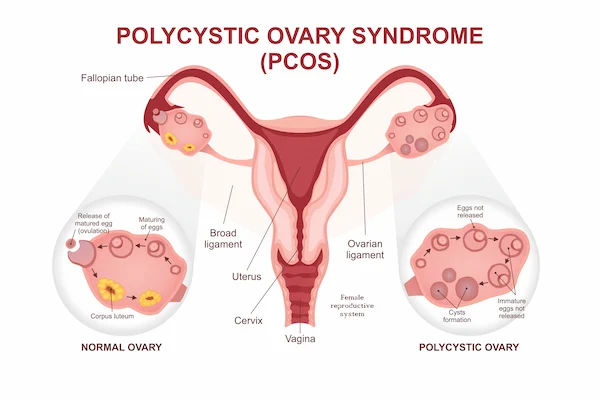How to Reduce Bleeding During Periods?
Discover ways of managing heavy menstrual bleeding through medical treatments, lifestyle changes, and prevention strategies for better menstrual health as well as overall well-being.

Written by
Last updated on 3rd Jul, 2025
Menstrual bleeding is a natural part of the reproductive cycle of women, but for some it is severe, which becomes a cause of concern. Heavy menstrual bleeding, better known as menorrhagia, is the result of various hormonal imbalances, the presence of uterine fibroids, polyps and certain underlying health conditions. While severe menstrual bleeding is distressing and hinders one’s everyday life, it is possible to manage and curb it. This guide delves into the reasons behind excessive bleeding, medical conditions that may play a role, and treatment options including lifestyle change and medical treatments.
Medical Conditions That May Cause Heavy Periods
Heavy menstrual bleeding may be caused by several medical conditions. They are:
Uterine Fibroids and Polyps: Problems with the uterine lining and blood flow can cause prolonged or heavy periods stemming from non-cancerous growths in the uterus (fibroids, polyps).
Hormonal Imbalances: Disruption in oestrogen and progesterone hormone levels can lead to irregular and excessive menstrual bleeding. Such conditions as polycystic ovary syndrome (PCOS), thyroid disorders, or perimenopause may be contributing.
Blood Clotting Disorders: Heavy and long menstrual periods can occur in people with certain bleeding disorders, such as von Willebrand disease and platelet function disorders.
Endometriosis and Adenomyosis: Heavy and painful periods are caused by endometriosis when tissue like the uterine lining is growing outside the uterus. If the uterine lining grows into the muscle of the uterus (uterine muscle), it is called adenomyosis. This leads to excessive bleeding and severe cramping.
Pelvic Inflammatory Disease (PID): PID is a bacterial infection affecting the reproductive organs and is characterised by inflammation and abnormal menstrual bleeding, pelvic pain and discomfort.
Importance of Medical Evaluation
It is very important to go for a medical evaluation for heavy menstrual bleeding to know the underlying reason. Consulting a doctor is crucial if an individual experiences:
More than seven-day periods
Excessive bleeding, requiring frequent or excessive use of pads or tampons
Severe pelvic pain or fatigue due to blood loss
Bleeding between periods or after menopause
Additionally, doctors may suggest a few tests to find out the cause of heavy bleeding, including:
Physical Examination: A pelvic exam to check for abnormalities
Blood Tests: To assess the level of hormones, clotting function, iron levels, etc.
Ultrasound Scan: To detect fibroids, polyps, or uterine issues
Hysteroscopy: It is a procedure by which the inside of the uterus can be examined
Endometrial Biopsy: To assess abnormal tissue growth or infections
Get Your Health Checked
Medical Treatments to Reduce Bleeding
Heavy menstrual bleeding can be treated medically by addressing the causes behind it. Medications that regulate bleeding and decrease pain include:
1. Nonsteroidal Anti-Inflammatory Drugs (NSAIDs)
Medications like ibuprofen and naproxen lower prostaglandin levels and reduce menstrual flow and pain, which affect uterine contractions.
2. Hormonal Therapy for Menstrual Regulation
Hormonal therapy helps regulate menstrual cycles and reduce heavy bleeding by balancing hormone levels.
Combined Oral Contraceptives: Regulate the hormone level and decrease bleeding
Progestin-Only Pills: Help in controlling extreme menstrual flow.
Hormonal Intrauterine Device (IUD): Releasing progestin to thin down the lining of the uterus and consequently reduce bleeding.
Gonadotropin-releasing hormone (GnRH) Agonists: Trigger temporary menopause for the treatment of the most severe cases.
3. Tranexamic Acid for Blood Clotting Support
The anti-fibrinolytic medication works by improving blood clotting without affecting hormone levels, thus reducing heavy bleeding.
4. Iron Supplements to Prevent Anaemia
Iron deficiency is one of the outcomes of heavy bleeding. Taking iron supplements will prevent anaemia and the associated fatigue.
Surgical Options for Severe Cases
The common surgical choices that help manage excessive bleeding and improve the quality of life include:
Endometrial Ablation: Minimally Invasive Uterine Lining Removal
It disrupts the uterine lining to eliminate or prevent menstrual bleeding. It is suitable for those who do not intend to conceive in the future.
Hysterectomy: Complete Uterus Removal
Heavy bleeding to the uterus can be resolved with a lifetime solution — a hysterectomy — in which the uterus is removed. It is used only if other treatments have failed or one has underlying conditions such as cancer or fibroids.
Myomectomy: Targeted Fibroid Removal
This procedure is performed to remove uterine fibroids but preserve the uterus. It is, therefore, a suitable option for women who want to have children.
Uterine Artery Embolisation (UAE) for Fibroid Treatment
UAE blocks the blood flow to fibroids, thus shrinking the fibroids and reducing menstrual bleeding. It is a less invasive procedure compared to others.
Dilation and Curettage (D&C) for Short-Term Relief
A D&C means scraping the uterine lining to remove the abnormal tissue and to decrease the heavy bleeding temporarily.
Consult Top Experts for Personalised Treatment
Lifestyle and Home Remedies
Support for menstrual health can be provided by the following effective natural approaches:
1. Making Dietary Changes
A well-balanced diet plays a crucial role in menstrual health by providing essential nutrients that support hormone regulation, reduce inflammation, and prevent deficiencies.
Eating Iron-rich Foods: Leafy greens, lentils, and lean meats help in preventing anaemia.
Increasing Vitamin C Intake: Improves iron absorption and supports blood vessel health.
Incorporating Healthy Fats: Fish and flaxseeds contain omega-3 fatty acids, which can control inflammation and hormone levels.
Drinking Plenty of Water: Water prevents bloating and helps in circulation.
2. Pain and Stress Management Techniques
Managing menstrual discomfort and stress through natural remedies can help alleviate cramps, improve circulation, and promote relaxation for overall well-being.
Heat Therapy: A heating pad or warm compress helps to relax uterine muscles and give relief from uterine cramps.
Gentle Exercise: Activities such as Yoga, walking, and stretching help in improving circulation and easing the discomfort.
Herbal Remedies: Herbal teas like ginger, chamomile, and cinnamon may help to ease some of the menstrual symptoms.
Stress Reduction: Meditation, deep breathing, good sleep, etc., help reduce stress, which is crucial to hormonal balance and health in general.
3. Keeping a Healthy Weight and Lifestyle
Maintaining a healthy weight and adopting mindful lifestyle habits can support hormonal balance, reduce period-related symptoms, and enhance overall menstrual health.
Regular Exercise: Helps in the regulation of hormones and reduces the excess oestrogen which can lead to excessive bleeding.
Cutting Caffeine and Alcohol: This can increase the balance of hormones and reduce bloating.
Avoiding Processed Foods: Avoid high sodium and sugary foods because this will worsen inflammation and period discomfort.
Alternative and Complementary Therapies
Some of the natural and holistic approaches that may help in reducing symptoms are:
1. Herbal Supplements
Certain herbs have natural properties that may help regulate menstrual cycles, reduce excessive bleeding, and alleviate discomfort associated with heavy periods.
Ginger: This can help reduce menstrual bleeding and alleviate cramps.
Anti-Inflammatory Spices: Possessing such properties, cinnamon may regulate menstruation.
Vitex Agnus-Castus (Chasteberry): Helps with balancing hormones and may alleviate excessive bleeding.
Turmeric: Turmeric contains curcumin, which helps regulate oestrogen levels and improve menstrual health.
2. Acupuncture
Acupuncture is believed to:
Improve blood circulation and decrease excessive menstrual flow.
Cure hormonal imbalances, which in turn lead to heavy periods.
Increases overall well-being by alleviating stress and menstrual cramps.
3. Yoga and Mind-Body Practices
Incorporating yoga, meditation, and breathing exercises can promote relaxation, ease menstrual discomfort, and support overall reproductive health.
Yoga Poses: Menstrual discomfort can be relieved by specific poses like child’s pose and reclining bound angle pose.
Meditation and Deep Breathing: It aids in managing stress, which can affect hormonal balance and menstrual cycles.
4. Ayurvedic and Traditional Medicine
Traditional healing practices offer natural remedies that can help balance hormones, regulate menstrual flow, and support overall reproductive well-being.
Ashwagandha: It supports adrenal function and relieves menstrual irregularities related to stress.
Shatavari: Traditionally used as a support for reproductive health and hormone balance.
Prevention and Management Strategies
Long-term methods of menstrual well-being are:
1. Regular Physical Activity
Engaging in consistent exercise helps regulate hormones, improve circulation, and manage stress, all of which contribute to better menstrual health.
Exercise aids in balancing oestrogen and progesterone levels.
Physical exercise releases endorphins and reduces stress. This decreases the discomfort of the menstrual cycle.
It increases the blood flow and avoids the stagnation in the pelvic region.
2. Keeping Track of Menstrual Health and Patterns
Monitoring menstrual cycles and symptoms can help identify irregularities early, allowing for timely interventions and better menstrual management.
Menstrual Tracking Apps: These apps allow one to track cycle length, flow intensity, and symptoms.
Identifying Irregularities: Changes in bleeding patterns can assist in the early diagnosis of underlying conditions.
Seeking medical advice when needed: Persistent changes can be checked by visiting a doctor before it is too late.
Psychological Impact of Heavy Periods
There are some ways to manage the psychological impact of having heavy periods and find suitable support, such as:
1. Coping with Anxiety and Stress
Managing emotional well-being through relaxation techniques and stress reduction strategies can significantly improve menstrual health and overall quality of life.
Mindfulness and Relaxation Techniques: Meditation, deep breathing, and progressive muscle relaxation can control stress.
Regular Exercise: Endorphins that are released during physical activity help in improving one’s mood and lowering anxiety.
Building a Support System: Talking with family and friends gives emotional relief and reassurance.
2. Seeking Support from Counselling
Professional counselling and therapy can help individuals cope with the emotional challenges associated with heavy periods, offering guidance and effective coping strategies.
Counsellors and Therapists: These professionals can guide people in handling the emotional distress caused by heavy periods.
Cognitive Behavioural Therapy (CBT): A method of structured therapy which allows a person to identify negative thoughts, manage and improve their resilience.
Connecting With Others: Connecting with others through support groups who may be facing the same obstacles gives comfort and helps find coping strategies.
3. Addressing the Impact on Daily Life and Self-Esteem
Heavy periods can affect daily activities and self-confidence, but with the right adjustments and self-care practices, individuals can maintain a positive mindset and improve their overall well-being.
Workplace and Social Adjustments: Managing period-related stress on the job as well as social settings increases confidence.
Education and Awareness: Understanding menstrual health is a step towards eliminating the feeling of being embarrassed and isolated.
Self-Care Practices: Focusing personal well-being via rest, hydration, and correct nourishment can help improve one’s mental health.
Conclusion
Certain medical treatments and lifestyle changes, along with emotional support, effectively deal with heavy menstrual bleeding. Menstrual health can be regulated by identifying the causes, consulting medical advice on time, and looking out for alternative therapies. Regular exercise, a balanced diet, and stress management also play vital roles. If one is persistent with symptoms, it is advisable to consult a healthcare professional to ensure that proper diagnosis and treatment are given to improve both physical well-being and overall quality of life.
Consult Top Gynaecologists
Consult Top Gynaecologists

Dr. Asha Rani Singh
Obstetrician and Gynaecologist
24 Years • MBBS DGO
Delhi
Dr Asha Rani Singh Clinic, Delhi

Dr. Parul Sharma
Obstetrician and Gynaecologist
8 Years • MBBS, MS (Obstetrics & Gynaecology)
New Delhi
THE DOCTORS NESST, New Delhi
Dr. K Anusha
Obstetrician and Gynaecologist
4 Years • MBBS, DGO
Yemmiganur
SRINIVASAA HOSPITAL, Yemmiganur

Dr. Sridevi Matta
Obstetrician and Gynaecologist
28 Years • MS ( OBG ), DGO, DNB Obstetrics & Gynaecology
Chinagadila
Apollo Hospitals Health City Unit, Chinagadila
(175+ Patients)

Dr. Shyamala Devi
Obstetrician and Gynaecologist
38 Years • MBBS, MS Obstetrics & Gynaecology
Vijayawada
Sri Shivshakti Nilayam, Vijayawada
Consult Top Experts for Personalised Treatment

Dr. Asha Rani Singh
Obstetrician and Gynaecologist
24 Years • MBBS DGO
Delhi
Dr Asha Rani Singh Clinic, Delhi

Dr. Parul Sharma
Obstetrician and Gynaecologist
8 Years • MBBS, MS (Obstetrics & Gynaecology)
New Delhi
THE DOCTORS NESST, New Delhi
Dr. K Anusha
Obstetrician and Gynaecologist
4 Years • MBBS, DGO
Yemmiganur
SRINIVASAA HOSPITAL, Yemmiganur

Dr. Sridevi Matta
Obstetrician and Gynaecologist
28 Years • MS ( OBG ), DGO, DNB Obstetrics & Gynaecology
Chinagadila
Apollo Hospitals Health City Unit, Chinagadila
(175+ Patients)

Dr. Shyamala Devi
Obstetrician and Gynaecologist
38 Years • MBBS, MS Obstetrics & Gynaecology
Vijayawada
Sri Shivshakti Nilayam, Vijayawada



.webp)
